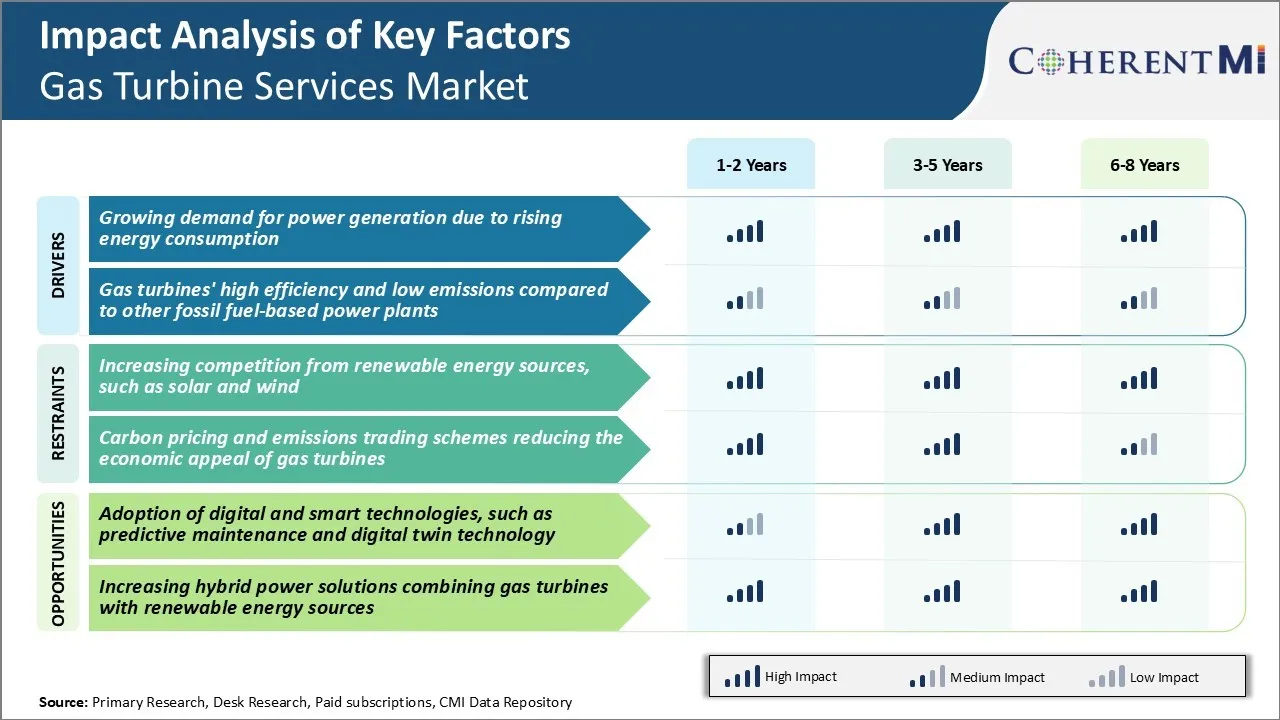Gas Turbine Services Market Trends
Market Driver - Growing Demand for Power Generation Due to Rising Energy Consumption
The ever-increasing demand for electricity across both developed and developing world is well known. Gas in particular is being increasingly relied upon especially in large power plants due to its relatively cleaner burning properties compared to coal or oil.
Established markets in Europe and North America are densifying their grids. Emerging economies in Asia, Africa, and Latin America are on massive infrastructure expansion drives. The switch from coal to gas is also happening gradually yet stubbornly due to environmental regulations against pollution.
Original gas turbine service providers are ramping up production lines to cater to this spike in demand. Third party service providers in the gas turbine services market too have sprouted alongside OEMs to capture a share of the profitable aftermarket services market with specialized offerings. As gas continues to drive the global energy transition for time being supported by policy pushes, gas turbines will remain at the forefront of power sector addition and revamp plans across world regions.
Market Driver - Gas Turbines' High Efficiency and Low Emissions Compared to Other Fossil Fuel-Based Power Plants
Environmental concerns have been at the heart of recent shifts seen in the energy domain worldwide. Furthermore, the high combustion temperatures achieved in gas turbines translate to excellent thermodynamic efficiencies even exceeding 60% for the latest heavy-duty designs.
As a result of the above technical and environmental merits over alternative fossil choices, gas fired power capacity has grown substantially globally at the cost of coal retirements in key regions. Original gas turbine equipment manufacturers have therefore uprated gas turbine models through the years to capture this switch and maximize plant efficiencies further.
In turn, they also benefit from a steadily growing worldwide installed base driving long term services revenue well into the future. With technologies progressing quickly, gas turbines seem set to remain the transition fuel of choice for plurality of power markets in the coming decades augmenting overall prospects in the gas turbine services market.

Market Challenge - Increasing Competition from Renewable Energy Sources, such as Solar and Wind
The gas turbine services market is facing significant competition from rapidly growing renewable energy sources like solar and wind. Solar and wind power prices have declined substantially in the past decade due to technological advances and economies of scale in manufacturing. This has made them increasingly cost competitive with fossil fuel-based power sources.
Many utilities and power producers are now prioritizing additions of renewable capacity to their power generation portfolios to meet decarbonization targets. Gas turbines, being emitters of greenhouse gases, are also facing regulatory and policy pressures in jurisdictions with ambitious climate change commitments. This poses a serious challenge to equipment life management plans and the demand for services in the gas turbine industry.
If the transition to renewables continues at the current pace, it could significantly curtail the gas turbine services market size.
Market Opportunity - Adoption of Digital and Smart Technologies
The adoption of new digital technologies presents promising opportunities for the gas turbine services market. Technologies like predictive maintenance, digital twins, machine learning and advanced data analytics enable remote monitoring of gas turbine operations.
Vibration, temperature and other operational data collected from sensors can be analyzed using these technologies to make highly accurate predictions about future repairs and overhauls required for each turbine component or system. This allows services providers to schedule maintenance in advance to minimize disruptions. It also helps utilities and owners optimize operations and reduces unplanned downtime.
These smart digital solutions can also help in improving fuel efficiency and turbine performance. Their growing use in the gas turbine services market is likely to drive new demand for services centered around implementing, maintaining, and supporting such technologies.